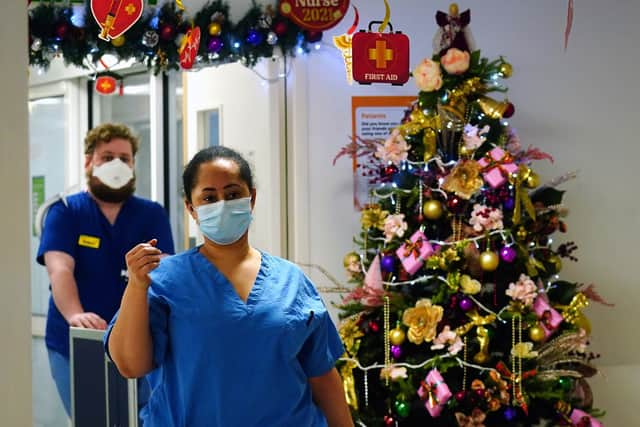Daily UK Covid cases higher than 100,000 for the first time in pandemic


A further 106,122 lab-confirmed Covid-19 cases were recorded in the UK, with a further 140 people dying within 28 days of testing positive.
But a report on the severity of Omicron due to be published on Thursday by the UK Health Security Agency (UKHSA) is expected to Omicron is causing less serious disease than the Delta strain of Covid, with more people are likely to have a mild illness with less serious symptoms.
Advertisement
Hide AdAdvertisement
Hide AdThe Politico London Playbook has reported the UKHSA are also expected to conclude that booster vaccines “significantly reduce” the chance of both infection and ending up in hospital. More than 30 million booster and third doses have now been delivered across the UK, with 6.1m in the past week.


However, the UKHSA is also expected to warn that the highly-transmissible nature of Omicron means large numbers could still end up in hospital.
Health Secretary Sajid Javid said on Wednesday that the analysis, which is expected to inform decisions on whether England goes ahead with further post-Christmas restrictions, “is not complete but I do look forward to receiving it”.
Across England, 7,080 patients were in hospital with Covid-19 on Wednesday – the highest number since November 4 and up 11 per cent week-on-week.
Advertisement
Hide AdAdvertisement
Hide AdOver 2,000 of the current English Covid patients are in London, an early epicentre of Omicron. The capital’s number of Covid patients is 48 per cent higher than a week ago.
The second-wave peak for England was 34,336 on January 18.
Today’s findings from the UKHSA follow a Scottish study finding early national data suggests Omicron is associated with a two-thirds reduction in the risk of hospitalisation when compared to Delta.
Scottish First Minister Nicola Sturgeon said the study represented “encouraging early data” but added that a smaller percentage of a much larger number of cases “will still put increased pressure on NHS and economy”.
A study in South Africa, where Omicron was first identified, has also people diagnosed with the variant during October and November were 80 per cent less likely to be admitted to hospital than those diagnosed with another variant in the same period. Those hospitalised were 70 per cent less likely to develop severe disease.
Advertisement
Hide AdAdvertisement
Hide AdA further study from the Imperial College London COVID-19 response team said estimates suggest Omicron cases are 15 per cent less likely to attend hospital, and 40 per cent less likely to be hospitalised for a night or more, compared to Delta.
Professor Neil Ferguson from Imperial College London said: “Our analysis shows evidence of a moderate reduction in the risk of hospitalisation associated with the Omicron variant compared with the Delta variant.
However, this appears to be offset by the reduced efficacy of vaccines against infection with the Omicron variant. Given the high transmissibility of the Omicron virus, there remains the potential for health services to face increasing demand if Omicron cases continue to grow at the rate that has been seen in recent weeks.”
It comes as the Joint Committee on Vaccination and Immunisation advised clinically vulnerable children aged five to 11 can start receiving Covid-19 vaccines.
Advertisement
Hide AdAdvertisement
Hide AdIt follows the Medicines and Healthcare products Regulatory Agency (MHRA) giving its approval for a new age-appropriate formulation of the Pfizer BioNTech COVID-19 vaccine.
It will be given at a lower dose compared to that used in individuals aged 12 and above.
The JCVI has currently stopped short of saying all primary school children should receive the vaccine, instead advising that it should be for those are in a clinical risk group or who are a household contact of someone (of any age) who is immunosuppressed.
The JCVI said further advice regarding a wider rollout of Covid vaccines for primary school children “will be issued in due course”.
Advertisement
Hide AdAdvertisement
Hide AdProfessor Wei Shen Lim, Chair for Covid-19 immunisation for the JCVI, said: “The majority of children aged five to 11 are at very low risk of serious illness due to COVID-19. However, some 5 to 11 year olds have underlying health conditions that put them at higher risk, and we advise these children to be vaccinated in the first instance.”
The JCVI has also recommended that 16 and 17-year-olds are offered booster vaccinations, along with 12 to 15-year-olds who in a clinical risk group or who are a household contact of someone who is immunosuppressed.
Vast majority of Covid patients are unvaccinated, says top doctor
Unvaccinated people make up to 90 per cent Covid hospital admissions, an ICU doctor said, as health experts urged the Government to improve transparency on pandemic data.
Advertisement
Hide AdAdvertisement
Hide AdProfessor Rupert Pearse said the vast majority of patients who are well enough to speak have admitted they were “anxious” or unsure what to believe about getting the jab.
Prof Pearse works at The Royal London Hospital and St Bartholomew’s Hospital in London, the city which has been the UK epicentre for the spread of the Omicron variant.
“The most common thing they say is: ‘Can I have the vaccine now please?’ But patients cannot have the vaccine until they have recovered. Between 80 and 90 per cent of the patients that we have are unvaccinated,” he told The Sun.
Comment Guidelines
National World encourages reader discussion on our stories. User feedback, insights and back-and-forth exchanges add a rich layer of context to reporting. Please review our Community Guidelines before commenting.